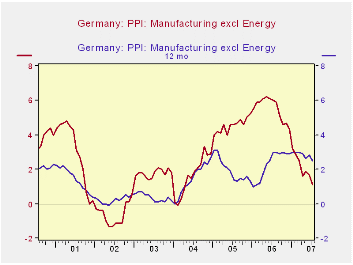 Global| Aug 17 2007
Global| Aug 17 2007German PPI Steadies at Above 2% Pace
Summary
Trends in German producer prices are partly favorable. Excluding energy, manufacturing PPI trends are sideways. The year-over-year rate has showed a slight downtrend while the six-month rate has popped up and the 3-month rate has [...]

Trends in German producer prices are partly favorable.
Excluding energy, manufacturing PPI trends are sideways. The year-over-year rate has showed a slight downtrend while the six-month rate has popped up and the 3-month rate has dropped from its month-ago pop-up. The three-month trend is unclear as despite its drop-off in the month it may still be in an uptrend that dates back to March. Prices of German manufacturing and mfg excluding energy show different forces are acting on them. As energy prices have ebbed overall German PPI inflation is dropping and has slowed to a 1.1% pace year/year. But the year/year pace for the Excl Energy Manufacturing PPI inflation rate is at 2.5% and is barely beginning to edge lower. With the ECB inflation ceiling for its HICP at 2% the PPI is not helping and the trend does not show the promise of much help to come, at least for nonenergy prices.
| M/M % Changes | %-SAAR | ||||||
| Jul-07 | Jun-07 | May-07 | 3-mo | 6-mo | 12-mo | 12-moY-Ago | |
| MFG | -0.1% | 0.3% | 0.3% | 2.0% | 1.9% | 1.1% | 6.0% |
| Ex Energy | 0.1% | 0.4% | 0.2% | 2.6% | 2.6% | 2.5% | 3.0% |
Robert Brusca
AuthorMore in Author Profile »Robert A. Brusca is Chief Economist of Fact and Opinion Economics, a consulting firm he founded in Manhattan. He has been an economist on Wall Street for over 25 years. He has visited central banking and large institutional clients in over 30 countries in his career as an economist. Mr. Brusca was a Divisional Research Chief at the Federal Reserve Bank of NY (Chief of the International Financial markets Division), a Fed Watcher at Irving Trust and Chief Economist at Nikko Securities International. He is widely quoted and appears in various media. Mr. Brusca holds an MA and Ph.D. in economics from Michigan State University and a BA in Economics from the University of Michigan. His research pursues his strong interests in non aligned policy economics as well as international economics. FAO Economics’ research targets investors to assist them in making better investment decisions in stocks, bonds and in a variety of international assets. The company does not manage money and has no conflicts in giving economic advice.
More Economy in Brief
 Global| Feb 05 2026
Global| Feb 05 2026Charts of the Week: Balanced Policy, Resilient Data and AI Narratives
by:Andrew Cates






